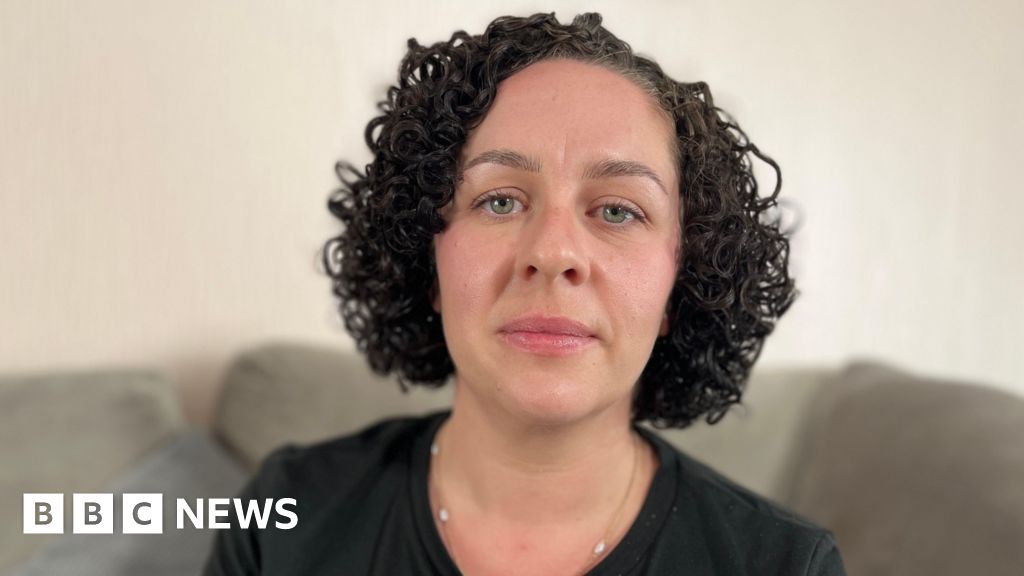Tracey Meechan’s pain from an ovarian cyst is so severe she can’t bend over – she relies on her children to help her put her shoes and socks on.
Every day the 41-year-old wakes up and wonders if any new symptoms are going to appear.
She has been on an “urgent” NHS waiting list for surgery for 100 weeks and now feels “forgotten”.
As the latest NHS Scotland waiting times data is due to be published, Mrs Meechan told BBC Scotland News that the wait for treatment has affected every part of her life.
‘It’s a drudge’
She said: “I can’t live my life to the fullest. I can’t do the activities I want to do with my kids. I can’t do the job that I love.
“I was signed off work at the end of January as a home carer because of the pain and the physicality of my job – I can’t do it.
“My mental health has declined. This has been years and the symptoms have worsened. It’s impacted my life, my personal life and my family.”
Mrs Meechan, from West Dunbartonshire, said she had to rely on her husband for household tasks.
“There is just no end point to it,” she said. “It’s a drudge.
“And there is only so much pain relief I can take and still try to be a mother to my children.”
The mother-of-five first went to her GP in 2021. She was found to have a large ovarian cyst and waited a year to see a gynaecologist after a referral from her GP.
After monitoring the cyst for six months, it had grown, so she was put onto the “urgent” list for surgery.
It is now 100 weeks later and she has not been called for an appointment.
She said: “I was under the impression it would be relatively soon as I was asked if I had any holidays planned in the immediate future.
“About a year ago I was advised by the GP to try to get in touch with the gynaecology secretary myself and I have been doing that on a regular basis letting them know I am still here and still waiting.”
She considered private health care but her surgery would cost £8,000 – something the family could not afford.
It was then she contacted the BBC through Your Voice, Your BBC News. She says the NHS has moved the goalposts each time she has called to ask about her surgery date.
“It’s another couple of months, or they are working on the routine list, or working on the long waiters,” she said.
“I was told at week 92 that they were working on women round about week 98-99, so it should be another couple of months.
“When I did get to week 99, I called up because I wanted to keep my employer up to date. I was told they couldn’t give me a date and still nothing is fixed yet.”
Before the pandemic it was rare for anybody to face a wait of a whole year to start NHS treatment, but that is not the case now.
We’ll have new data from Public Health Scotland this morning, but the most recent figures show almost 25% of the entire inpatient waiting list for non-urgent care is made up of waits longer than 52 weeks.
In gynaecology, the specialty that Tracey comes under, there were 291 waits of over three years.
Waiting always has consequences – more frequent visits to the GP to manage pain, struggles to work or stay healthy in other aspects of life.
The government says tackling waits is a priority and has set a target to create 150,000 additional appointments this year.
Ministers will be hoping this is achievable given they did not fulfil a previous promise to eradicate all waits over a year by September 2024.
In January First Minister John Swinney pledged to bring down NHS waiting lists and make it easier to get GP appointments.
He set out three priorities: to reduce immediate pressures in the NHS; shift the balance from acute services to the community and to use innovation to improve access to care, promising the health service would carry out an extra 150,000 appointments and procedures in the coming year.
Then at the end of March, Health Secretary Neil Gray launched the Operational Improvement Plan, which he said would make the NHS “more accessible” and cut into backlogs for patients to be seen.
This would involve an extra £200m in funding for weekend scan appointments and tests and an expansion of hospital care at home.
The announcement came after the public spending watchdog, Audit Scotland, said NHS initiatives to improve productivity and patient outcomes have yet to have an impact.
NHS Greater Glasgow and Clyde has been contacted for a response.
The Scottish government said it had delivered around 3,300 additional gynaecology appointments and procedures in 2024-25 and that this year’s £21bn health and social care budget would include almost £200m to reduce waiting lists with gynaecology earmarked for extra funding.
Women’s Health Minister Jenni Minto said: “Women’s health is key priority for the Scottish government, and we were the first country in the UK to publish a Women’s Health Plan, which aims to reduce inequalities in health outcomes for women, in August 2021.
“Timely access to gynaecology services will be a priority in the next phase of our plan.
“Excessively long waits are not acceptable, and I sympathise with any patient whose treatment has failed to reach the standards we all expect from our health system.
“We are working intensively with NHS boards to reduce the length of time people are waiting for appointments and treatment.”
Source link : https://www.bbc.com/news/articles/cy75p2zx0k4o
Author :
Publish date : 2025-05-27 05:16:00
Copyright for syndicated content belongs to the linked Source.
